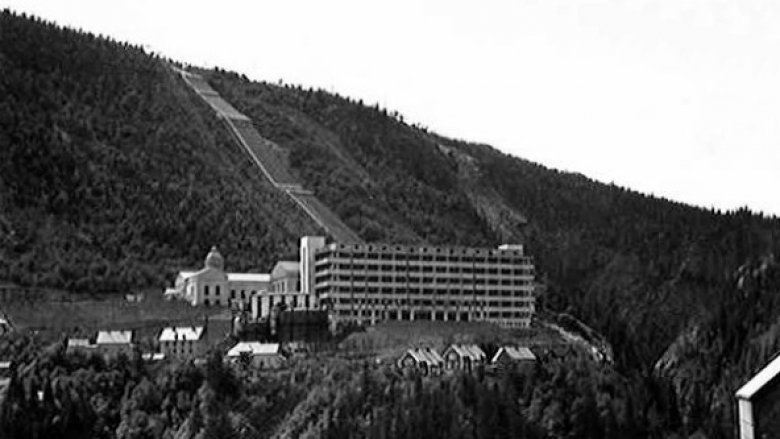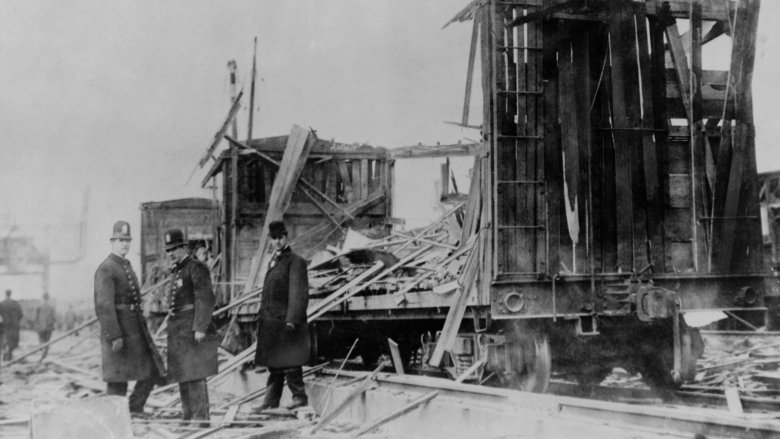Insane Instances Of How Sabotage Changed The Course Of History
Since the dawn of time, sabotage has been a favorite human pastime, a way for us to secretly get back at one another for such horrible transgressions as getting promoted at work, marrying someone who's too good for you, or just doing a little better in life. Because let's face it, it's easier and more satisfying to destroy someone's life and reputation than it is to, you know, just get over yourself. But sabotage is so much more than just a way for individuals to be petty and vicious. It's also a great way to win a war, to thumb your nose at the world if you don't happen to win the war, to infiltrate enemy infrastructure, and to knock down your political opponent in the event that you don't actually have a chance of defeating that person honestly. And some acts of sabotage are so big and impactful that they've actually changed the course of history.
The glorious rise of dirty politics
Despite what it might feel like sometimes, America was not actually founded on the principles of dirty politics. No, it took years before it ever occurred to anyone that it was easier to win an election by playing dirty tricks on your opponent.
According to the History News Network, the first act of political sabotage in America happened in 1844, when a newspaper claimed some dude name Baron Roorback had seen some very badly treated slaves belonging to presidential candidate James Polk. Now, never mind that the very fact that Polk had slaves at all already meant they were badly treated, but Roorback asserted that Polk had also branded them, a practice that was frowned upon in the 1840s even though owning human beings was not.
It was all totally untrue, though. There was no such person as "Baron Roorback," which should have been pretty obvious based entirely on the lameosity of his name. But the saboteurs didn't even bother to write their own fiction, they borrowed it from a travel memoir, which had mentioned the branded slaves but had said nothing about Polk. The Roorback hoax wasn't enough to cost Polk the election, but it did set a precedent for dirty politics that exists to this day, so, yay America.
Why Americans don't speak German
The pursuit of the nuclear bomb was not just an American thing — it was literally a race, and if it had gone differently we would all be living in a very sucky world. Yes, way suckier than the sucky world we currently live in, so just pause and think about that for a moment.
According to Archaeology, the Germans, too, were trying to develop a nuclear bomb. To begin their research, the Germans needed a heavy water plant, which they didn't have, but then they invaded Norway and took control of the Vemork Norsk Hydro Plant, and then they did have a heavy water plant. Pretty much anyone who knew anything about heavy water manufacturing understood that German control of the plant was Very Bad, so they devised a plan to sabotage it.
Norwegian fighters participating in Operation Gunnerslide had to climb down the icy walls of a 656-foot ravine to gain access to the plant. Once inside, they planted explosives and then retreated the same way they'd arrived — back up the slippery slopes of the ravine. The explosion succeeded in both stopping production and destroying about 100 gallons of heavy water, and is maybe also the reason we are not all speaking German today.
Burning bridges (literally)
During the American Civil War, no one really had to worry about the kinds of problems we worry about now, but they did have to worry about enemy troops marching into their backyard, so bridge sabotage was kind of a thing. The war's most significant act of bridge sabotage happened in 1863, after the Confederate army invaded Pennsylvania and was making plans to push on into Harrisburg and Philadelphia. According to Civil War Trails, they planned to cross the Susquehanna River at Wrightsville by way of the First National Bank of Columbia's pet project, a mile-plus-long bridge.
Well, the people on the other side didn't want 1,800 enemy troops coming into their town, eating all the food, and drinking all the water, so the Union sent some people to stop the Confederate advance. First, Union fighters tried blowing up part of the bridge. The explosion wasn't very effective, though, so they ended up just burning the whole thing, which must have really upset the First National Bank of Columbia.
The Confederates were thwarted, so they turned around and slunk back to York, and a few days later they ended up in Gettysburg, where they got their butts kicked in the battle that turned the tide of the Civil War.
You are so totally not really neutral
In the early part of World War I, America was like, "We're neutral," but at the same time they were all, "Here, England, have some munitions." They weren't exactly stealthy about it, either. According to the Smithsonian, Black Tom Island in New York Harbor was a major storage facility and depot for explody things, and pretty much everyone knew it. Anyway, on the night of July 30, 1916, fire broke out on the island.
Fire and explody things don't usually get along, and that night there were 50 tons of TNT packed on a barge, and 1,000 tons of ammunition on 69 railroad cars, all of which was set to depart to England to help with the war effort, you know, in the most neutral sort of way. By 2 a.m., fire and explody things met, and the resulting blast was felt up to 90 miles away and measured 5.5 on the Richter scale. The damage was estimated at about $20 million, which is a half billion in today's dollars.
Authorities didn't know who to blame, so they started with railroad officials and worked their way down to the guards at the pier. It was literally years before anyone solved the puzzle. The culprit turned out to be a Slovak immigrant who'd probably been recruited by German spy Franz Von Rintelen. Some historians think the Black Tom incident was the first example of a terrorist attack on U.S. soil by a foreign power.
Outrageous acts of nose-thumbing
According to Melvin Pugh's Roman Rule: The Eternal Empire, in 1990 Saddam Hussein invaded Kuwait and then was shocked because the rest of the world did not seem to be cool with what he'd done. Faced with his own downfall, he had his men dump somewhere between 42 million and 400 million gallons of oil into the Persian Gulf, in the hope that the spill would stop U.S. Marines from landing. Then he destroyed between 600 and 700 Kuwaiti oil wells in an apparent act of "nah, nah, nah-nah-nah." The wells burned for 10 months and created an environmental disaster, and also didn't really do Hussein any favors in the eyes of the U.S. or NATO.
Hussein retreated back to Iraq with his tail between his legs, and then went on being a sadistic megalomaniac by squashing a couple internal rebellions, murdering some people, and forcing thousands to flee to refugee camps. He continued to be all dictatory for another decade, until good ole George W. finally decided to end his rule in 2003. He was eventually found living in a hole in a farmhouse near Tikrit and was executed a few years later. Time called the Kuwaiti oil fires one of the top 10 environmental disasters of all time, and the oil lakes that formed afterward still plague Kuwait to this day.
Dead men tell no national secrets
In popular culture, corpses are either buried, or they walk around trying to eat people all the time. They never really participate in acts of sabotage that change the course of history, except for that one time. According to the BBC, in April 1943 the body of a British soldier was found floating in the ocean near Spain. The corpse was chained to a briefcase full of super-secret-looking documents, which outlined the Allied plan to attack German-held Greece. The documents eventually found their way to Germany, and the Germans shaped their next moves based on this lovely intel about what the Allies were up to.
It was all fake, though. The documents were fake, the plans were fake, and even the body was fake. Well, it was a real body, but it came from a London coroner. Operatives gave the body a false identity, a backstory, and a wallet full of photos and wallet junk, and then they dumped him in the sea in the hope that he'd eventually wind up in German hands.
So based on the false information in the dead man's briefcase, the Nazis were totally unprepared when the Allies invaded Sicily in July 1943. That act eventually led to the downfall of Benito Mussolini, which in turn changed the course of World War II.
You, too, can sabotage from the comfort of your own basement
If you need info about what your enemies are up to today and you have some skilled hackers hanging around, you can just rifle through your enemies' files from the safety and comfort of some little basement in Siberia.
In June 2016, hackers believed to have been working for the Russian government infiltrated the Democratic National Committee's computer network and stole a bunch of documents that turned out to be sort of important to the 2016 presidential campaign. The hacker or hackers then leaked the information to the American press, and since the American press just can't help itself when it comes to printing stuff that hackers and leakers send their way, it all ended up in the public eye. According to NBC, the hackers stole and then distributed the DNC's plan of attack for defeating then-candidate Donald Trump, and they were actually kind of cavalier about it. FBI director James Comey called the attack "noisy," adding, "It was almost as if they didn't care that we knew what they were doing."
Whether the attack actually changed the outcome of the election is still debated, but it did set a rather terrifying example for the rest of America's adversaries: For all its big talk and high tech, the U.S. is vulnerable.
The DNC hack was for wimps
A few years before the DNC hack, the U.S. and Israel executed a cyberattack that actually was a lot more significant than just stealing a bunch of documents from squabbling politicians. Stuxnet was a two-part attack against Iran, which specifically targeted the Natanz nuclear facility. In the first phase, hackers had to figure out how the Iranian technology worked, and in the second phase, they had to create a worm that, when introduced into the Natanz computer system, could cause a lot of damage without also causing any alarm.
According to Business Insider, an Iranian double agent delivered the worm via thumb drive, and once it was in the system it made the uranium-enriching centrifuges spin incorrectly — slowing down, then speeding up again, until eventually they sort of crapped out and died. Meanwhile, the worm also cleverly played recordings of "all's well" messages so the safety guys at the plant would have no idea what was going on, sort of like unwitting Homer Simpsons only without the drool and doughnuts.
The attack destroyed roughly one-fifth of Iran's nuclear centrifuges, setting the Iranian nuclear program back by at least a couple years. Stuxnet might not have received all the giddy reporter attention that the DNC hack received, but let's face it, it takes way bigger oysters to sabotage a nuclear facility than it does to steal some documents from the dino computers that are still running the U.S. government.
Why sabotage stuff when you can have thousands of private citizens sabotage stuff for you?
Sabotage is never easy, even when you're doing it from the relative safety and comfort of your Siberian basement. So one day during World War II, the CIA was sitting around thinking to themselves, "There must be an easier way to sabotage things" when someone realized there were thousands of private citizens already living in the places where the CIA would really like things to be sabotaged. If they could get those private citizens to do all the sabotaging, the CIA would no longer have to worry about getting its own operatives in and out of dangerous places.
According to Slate, the CIA's first step was to print a handy little manual called Simple Sabotage Field Guide, which it gave to operatives who were then supposed to teach the locals how to wreck stuff in the name of freedom. In the book's foreword, operatives were reminded that locals tended to be poor saboteurs because it goes against instinct to wreck valuable things, even if it means advancing the war effort.
Anyway, the manual contains some gems of wisdom that government still uses today, though mostly just to sabotage itself. Under "General Interference with Organizations and Production," it suggests "Bring[ing] up irrelevant issues as frequently as possible" and "Spread[ing] disturbing rumors that sound like inside dope." Brilliant. Just ... brilliant.
Poland had a James Bond, only without the pronounceable name
During World War II, saboteurs were almost like another branch of the military, responsible for everything from the destruction of military property, to the annoying of military leaders. According to Bernard O'Connor's Sabotage in Greece, one of the most famous Polish saboteurs was a guy by the name of Jerzy Ivanov-Szajnowicz, who was widely believed to be Poland's own James Bond, although you have to admit that "Ivanov-Szajnowicz. Jerzy Ivanov-Szajnowicz" has a much less robust cool factor than "Bond. James Bond."
Ivanov's many acts of sabotage included planting hollowed-out pieces of coal filled with explosives on coal-powered trains, mining German submarines, and destroying German fuel tanks and aircraft. Ivanov was evidently a master of disguise, because on one occasion he managed to convince everyone he was a German soldier, and on another occasion he managed to get hired by a Greek plant to repair German aircraft engines. It won't surprise you to hear that he didn't actually repair any engines, he just sabotaged them. You might be surprised to hear that he also recruited a bunch of co-conspirators already working in the plant, and together they destroyed between 400 and 450 German aircraft. Ivanov was on the Germans' list of people they really wanted to capture, and a reward for 2 million drachmas finally convinced a so-called friend that he ought to be turned in, and he was executed on January 4, 1943.










